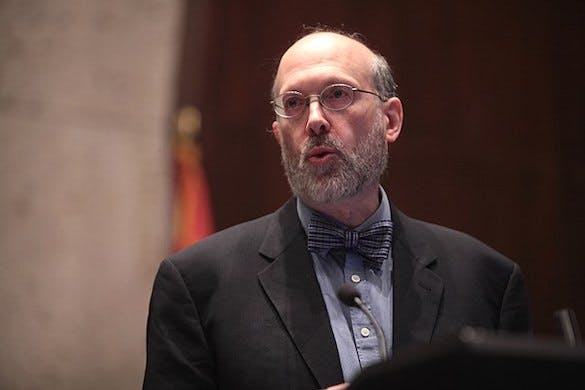A Constitutional Threat to Public Schools Comes Into View
A legal scholar argues that America’s public school system is unconstitutional.

A professor of constitutional law at Columbia University, Philip Hamburger, argues in a recent law review article that education constitutes speech. Compulsory education laws coupled with the financial pressures to attend public school result in a large-scale violation of the First Amendment right to free speech, according to Mr. Hamburger.
Parents, he says, are “not acting entirely voluntarily” and are subject to governmental pressure to substitute a teacher’s speech for their own. He asserts that “parents are being pressured in a way that abridges their own educational speech and compels them to adopt the government’s.”
For Mr. Hamburger, the “combination of mandated education and subsidized state schooling forces parents either to submit to government educational speech or pay to avoid it.”
The legal sage goes on to explain that the choice of school for one’s children is a kind of “substitution of speech,” and so the pressures to enroll in public school are tantamount to compelled speech, a constitutional prohibition.
Mr. Hamburger posits that a government program cannot premise itself on “unconstitutional conditions,” meaning that a school system cannot violate the First Amendment and pass constitutional muster — a legal principle expounded in the watershed education case Brown v. Board of Education.
Mr. Hamburger’s legal analysis effectively calls for an overhaul of the public school system as Americans know it — at least its funding mechanisms, which he views as pressure levers.
Parents, the argument goes, should be able to choose to educate their own children or at least have a choice in whose speech they are substituting for their own — which may or may not include the government’s.
Mr. Hamburger mentions viable alternatives such as tax credits and vouchers as possible mechanisms to avoid what he sees as the constitutional issues in the current school education funding system.
The article appears in the pages of the Texas Law Review as the issue of school transparency heats up. A parental rights movement, which asserts the primary role of parents over school administrators and bureaucrats in directing the education of their children, has kicked into high gear.
That movement was galvanized by the Covid pandemic, when schools across the country were shut down. Some parents were upset by the prolonged closures, while others were disturbed by what they discovered about their children’s curricula when school was set up at home.
Since 2020, a coalition of parents has emerged to decry pedagogical practices around racial diversity, gender ideology and identity, and social-emotional learning.
For the most part, when these issues mature into lawsuits, though, parents’ advocates rely on arguments found in an unenumerated right from the 14th Amendment — a parent’s right to “direct the upbringing and education of children under their control.”
That right, however, is not found in the Constitution itself but in a Supreme Court case from 1925, Pierce v. Society of Sisters. The court’s decision in Pierce, which invalidated an Oregon law mandating all students attend public schools, is attributed to the doctrine of “substantive due process.”
The doctrine posits that the 14th Amendment’s guarantee that no “State deprive any person of life, liberty, or property, without due process of law” includes both procedural due process — a fair trial and attendant safeguards, in other words — and substantive rights to “life, liberty, or property.”
The argument has been used to advance parental rights, contraception rights, abortion rights, and a host of other protections for rights not included in the text of the Constitution.
Many conservative jurists, including Justice Clarence Thomas, reject the premise of substantive due process altogether as an invention of jurists unmoored from the text of the national parchment. Judge Thomas has referred to it as a “legal fiction.”
Mr. Hamburger suggests that a parental rights movement founded on an enumerated right — that is, the freedom of speech found in the Bill of Rights — to educate one’s child stands on firmer ground than an unenumerated right to access and modify curricula and school policy.
The professor acknowledges that parents, relying on Pierce, make “powerful arguments based in morals and political theory,” but the education as speech argument “offers something more: the force and clarity of an enumerated constitutional right.”
The idea, though, is not without its critics. A former federal prosecutor and current columnist at National Review, Andrew McCarthy, accused Mr. Hamburger of “straining to bring this right under the umbrella of the First Amendment” in order to avoid a defense founded on substantive due process.

